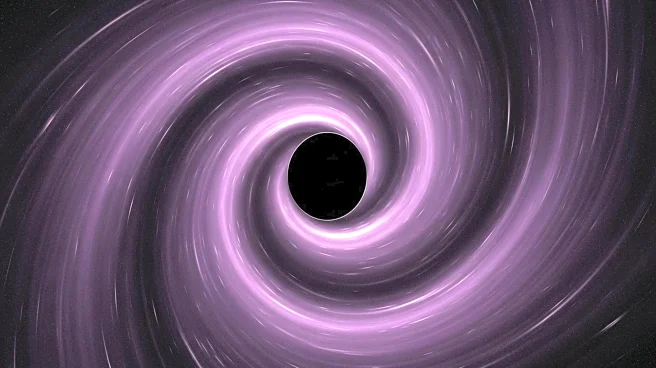What is the story about?
What's Happening?
Black holes are among the most intriguing and perplexing objects in the universe, captivating scientists and the public alike with their extreme properties. These cosmic entities are not actual holes but regions where immense amounts of mass are compressed into an extraordinarily small volume, creating gravity so intense that nothing—not even light—can escape. This boundary, known as the event horizon, marks the point of no return, encapsulating all the matter within. While black holes remain invisible due to their light-trapping nature, their effects on surrounding matter and space-time provide crucial insights into their existence and behavior. The concept of black holes dates back over 200 years, but their theoretical foundation was solidified in the 20th century. University of Chicago professor Subrahmanyan Chandrasekhar, at just 19 years old, calculated that stars exceeding a certain mass—about 1.4 times that of the Sun—would collapse into these dense objects after exhausting their nuclear fuel, a discovery that earned him the Nobel Prize in 1983 despite initial ridicule. Albert Einstein's general relativity further supported this, describing black holes as singularities where space-time curves infinitely.
Why It's Important?
Black holes play a crucial role in understanding the universe's structure and evolution. They are pivotal in galaxy formation, influencing star birth and spreading atoms via jets and winds. The study of black holes challenges existing physics, offering insights into extreme conditions and testing theories like general relativity and quantum gravity. The discovery of gravitational waves from colliding black holes has opened new avenues for astronomical research, allowing scientists to measure their masses and distances. Black holes also help in determining the Hubble Constant, which is essential for understanding the universe's expansion rate. As telescopes advance, black holes promise deeper revelations about the cosmos, from galaxy evolution to fundamental laws.
What's Next?
Future advancements in telescope technology are expected to provide more detailed observations of black holes, potentially uncovering new aspects of their behavior and impact on the universe. The Event Horizon Telescope's success in capturing images of black holes like M87 and Sagittarius A* marks a significant milestone, paving the way for further exploration. Scientists aim to resolve mysteries such as the 'information paradox' and the nature of singularities within black holes. Continued research may also reveal why many galactic black holes remain dormant and how they influence their host galaxies.
Beyond the Headlines
Black holes are not just cosmic phenomena; they are central to understanding the universe's most extreme conditions. Their study raises profound questions about the nature of reality, challenging our perceptions and pushing the boundaries of scientific knowledge. The exploration of black holes could lead to breakthroughs in understanding fundamental laws of physics, potentially offering solutions to longstanding puzzles like the 'information paradox' and the nature of singularities.















